The World Tour promotion and relegation topic ought to be simple with the top-18 teams on the rankings making the cut… but it turns out to be a lot more complicated. For starters there are no official rankings, the rules are spread across disparate few paragraphs inside a 200 page PDF tucked away on the UCI website and more, no wonder people are confused.
I get regular comments about the promotion relegation system in the comments, by email and over on Twitter and if some are asking, a lot more must be wondering. With this in mind, here’s some of the frequently asked questions and a go at the answers.
Why promotion and relegation?
So teams in the top tier of cycling, the World Tour – strictly speaking the “WorldTeams” – equate to the top teams. The flipside is under-performers can get demoted, but only every three year process.
3 years?
Yes, this is not an annual event. It’s measured over the 2020, 2021 and 2022 seasons, and the next promotion and relegation cycle will be 2023-2025.
Why three years?
Promotion and relegation are a big deal, it’s more than an administrative label. Being in the top tier means an automatic invitation to the Tour de France, the golden ticket. But it also means the obligation to ride all the World Tour races and to have a roster capable of this, this can’t happen from one season to the next. Also measuring things over three seasons helps back a trend over an anomaly, there are ways to make amends for a rotten year or a star rider sustaining a big injury.
Weren’t 2020 and 2021 hit by the pandemic?
Of course, there wasn’t a full season and even this year’s seen riders stopped. But there weren’t any loud objections to this system before it was introduced, nor during the disrupted 2020 season. So it’s hard to argue against it now, although teams in trouble still could.
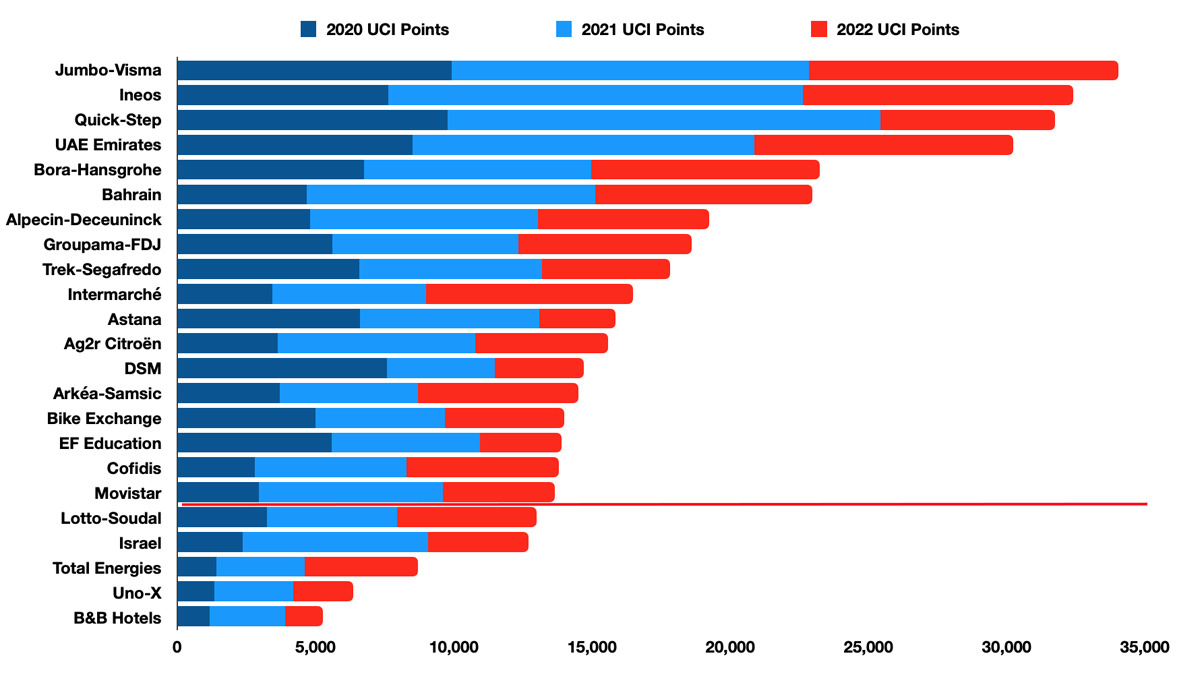
What are the rankings based on?
Teams are ranked on the basis of their ten best riders across three separate seasons. So you take a team’s ten best points scorers as measured by the UCI rankings points they scored from the 2020 season and add up all their points to get the team’s total for 2020. Then you look up a team’s best ten from 2021 and get their points. Likewise from 2022. Add these three numbers up to get a team’s total. Then rank the teams, like you can see this week’s version of this in the chart above. Everything else being equal, the top-18 make the World Tour, while any WorldTeams ranked 19th or below are relegated.
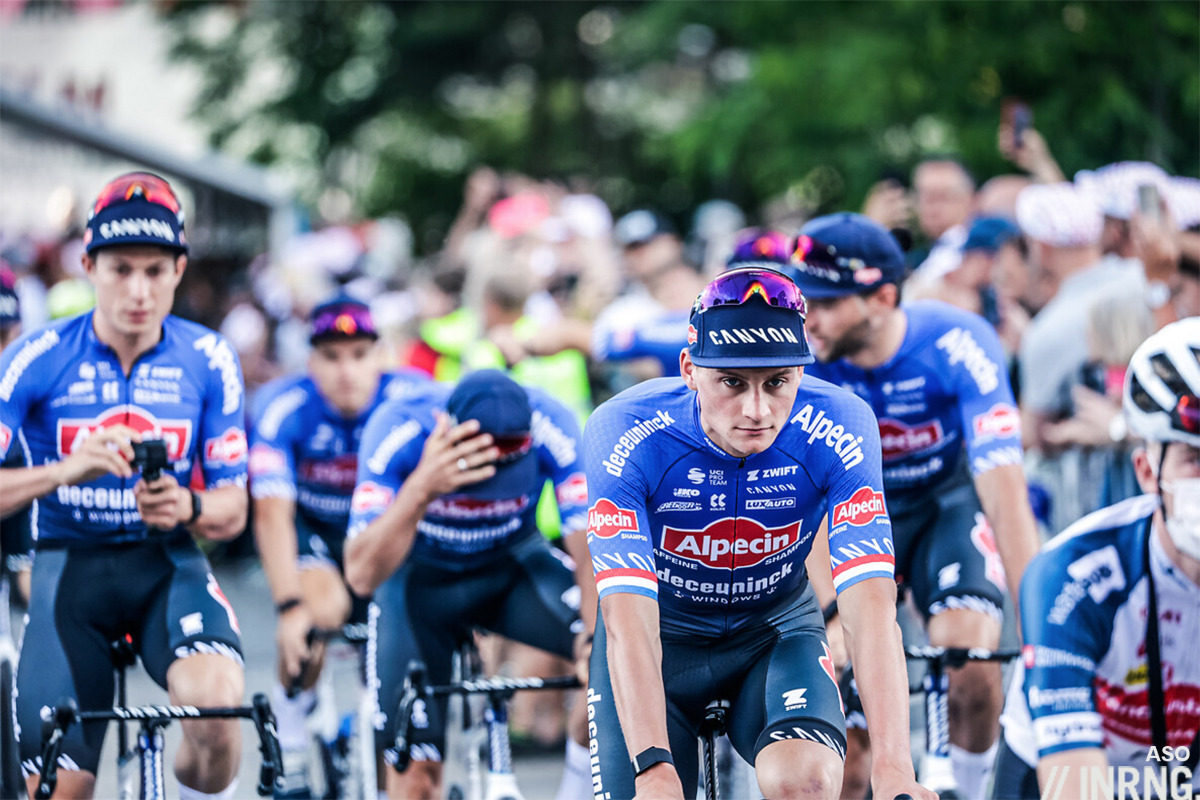
Everything else being equal?
Well teams among the top-18 that aren’t in the World Tour have to apply for promotion, it’s not automatic, and the paperwork had to go early this year. But we know both Alpecin-Deceuninck and Arkéa-Samsic have said they want to be promoted and currently they have sufficient UCI ranking points. So now it’s down to them meeting the admin and financial criteria set by the UCI but as they’re existing, stable teams this is probably a formality. But there’s also the possibility of a current WorldTeam deciding to stop, or their sponsorship drying up all of a sudden, like Qhubeka vanished at the end of 2021, although currently this is theoretical rather than likely.
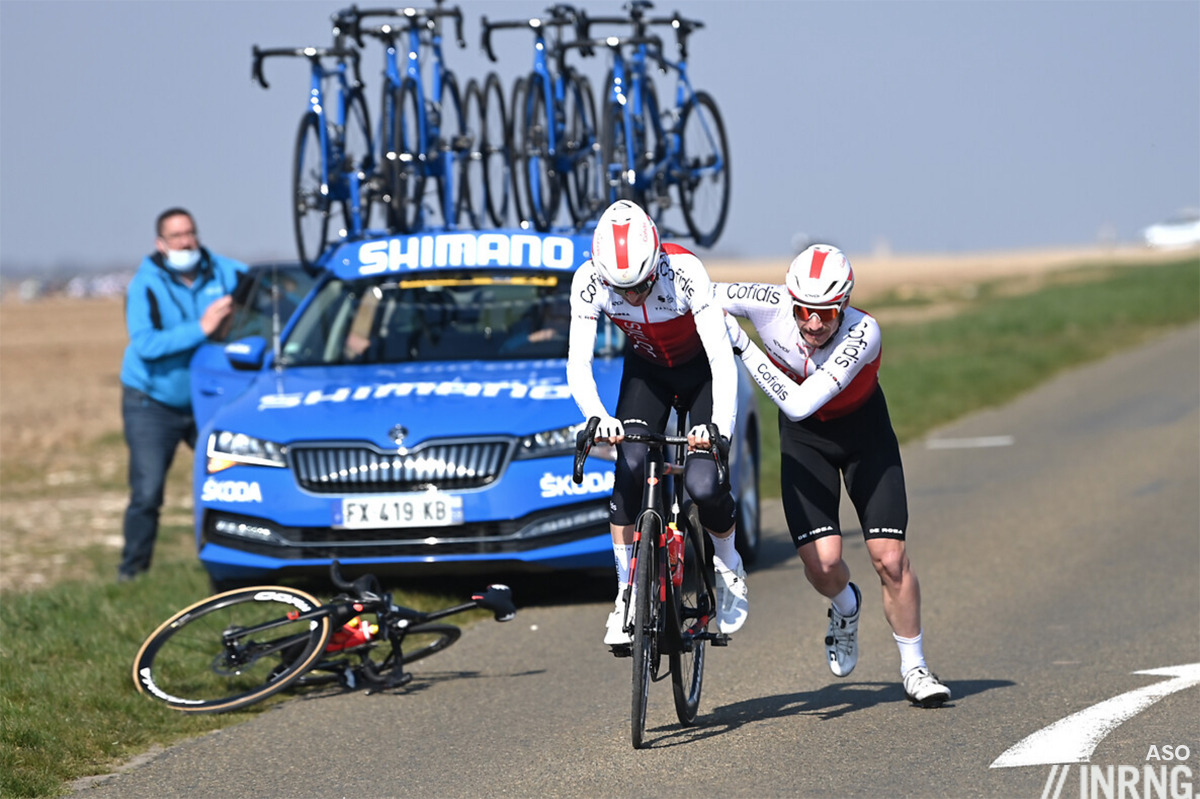
Why ten riders?
The idea is it allows the other 20 riders can work and help set up results, a worker can pull in the wind or give a spare wheel without a second thought about points. It’s likely that that most team’s 25th best rider has no or almost no points anyway. It might also help balance things a touch between big and modest budget teams as wealthy team’s 11th rider, 12th rider and so on could have more points. Ten is a useful cut-off, go in the other direction to five and it would make a team’s fortunes very reliant on a handful of stars.
Do points follow riders if they change teams?
No, and twice over. First if a rider moves teams over the winter their points are back at zero for the start of each season. There are exceptions like the Worlds but normally it’s all about points being earned while riding for the team. Second if they have a mid-season transfer the rules (2.10.014, screengrabbed above) state points earned during the first part of the season stay with the first team and it’s back to zero with the second team. So currently Dylan Teuns has zero points for Israel-PremierTech.
Points to zero?
Yes. It’s reset at the start of the season. Now you might want to know how many points a rider has at the moment and look at the UCI’s Individual World Rankings and see their points tally. But that particular individual ranking is compiled on a rolling 52 week basis and can include points they won with a different squad last season. The team rankings are based on each season’s count.
Where’s the data?
Well the UCI website has a rankings section which is updated weekly every Tuesday morning. Click on the team rankings and you can click through to see a team’s 10 best riders.
But the actual promotion and relegation rankings aren’t published by the UCI. Why? Maybe the UCI and teams probably didn’t want a running commentary of which teams are at risk. So every Tuesday this blog grabs the UCI’s latest data and puts it into a spreadsheet and the standings are published here.
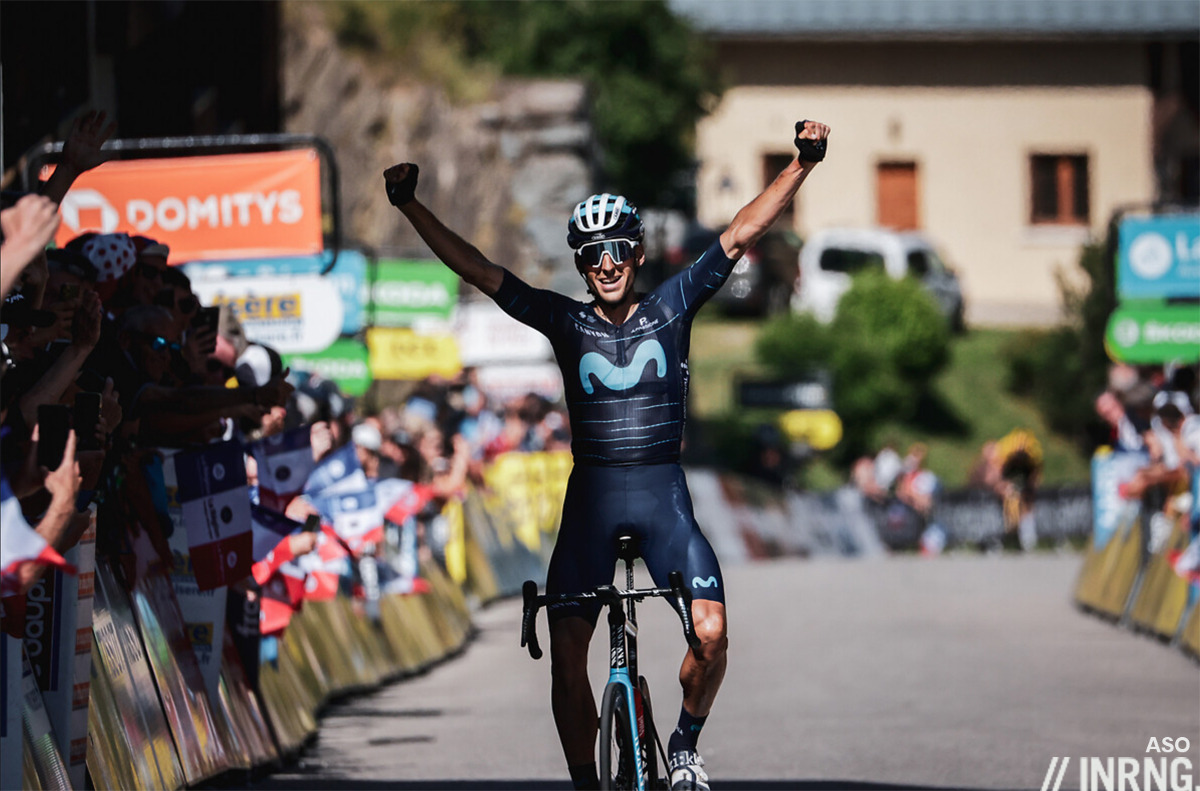
How do riders and teams win points?
By winning and placing. It’s a big topic in itself and so all set out in a separate blog post from earlier this year, have scroll around.
Riders can also lose points if they’re fined so remember you might see a result and add the points but unless you can get the race jury’s report as well it’s hard to keep track of all the points with precision.
I saw the points tables, why is the points scale biased to one day races?
It is if you compare winning a one day race to winning a stage in a grand tour, winning a 1.Pro race like, say, this week’s Circuit Franco-Belge brings 200 points compared to 120 for a Tour de France stage win and obviously a Tour stage win is much more hard fought, the field is more dense and watched by more, it’s just so much more prestigious. But then if you upped the value of Tour stage win to, say 300 points, then you’d have to bump up the value of the overall win even more, no otherwise a sprinter with three stages and a coupe of wins would be higher ranked than the overall winner. In doing this you’d end with our original 1.Pro race being left even more in the shadows of a big race. In a way the points scale just hasn’t mattered much, people – including team managers with wage bills – judge a rider’s value by the big races they’ve won or could win. Likewise while there are no historical rankings to compare Eddy Merckx with Bernard Hinault, when people compare, say, Bradley Wiggins with Cadel Evans or Fabian Cancellara with Tom Boonen, it’s the wins and placings that counts, nobody ever looks at their UCI points haul. Points and rankings just haven’t mattered until now.
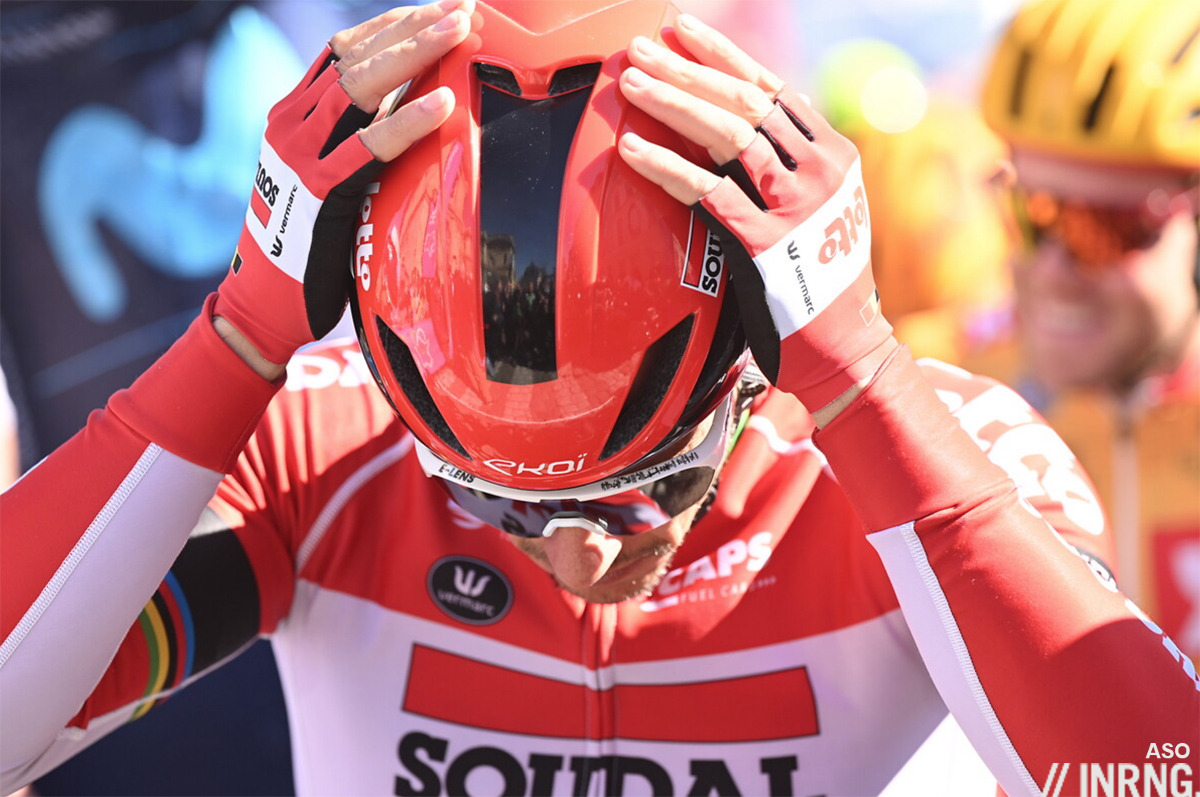
Is relegation that bad?
It’s relegation, not termination. But teams, sponsors and riders all like the World Tour concept because it guarantees them a start in the major races, especially the Tour de France. A relegated team might still make the start but just the risk that it won’t be there can be costly. Sponsors and their marketing budgets want visibility, not risk. Riders will be harder to recruit if the team isn’t going to race as much: why sign for a team if it might not ride the Tour de France, might only do one grand tour a year or get fewer invites to other races? Plus some riders have contracts with small print saying they can leave if the team is out of the World Tour, which means valuable riders can leave while those who are worth less on the market than their contract are incentivised to stay on the books as a liability. Relegation can mean different things to different teams, the Belgian state lottery might still commit to a project; an Israeli billionaire funding his own team may still love the challenge of building up and so on but these are questions to confront later.
What about the wildcard invites?
Relegated teams are out of the World Tour but can still be invited to the top races. There’s two parts to this. First, the two highest rated ProTeams of this season get automatic invites to the grand tours next year. Crucially any relegated WorldTeam becomes a ProTeam all of a sudden for these purposes and if they are among the best two ProTeams on the 2022 rankings they’ll get an automatic invite to the Tour de France. It’s why, as of today, Lotto-Soudal could be relegated and invited but Israel would be relegated but not invited, as on a synthetic ProTeam ranking, Lotto-Soudal are first and TotalEnergies are second.
Which leaves the second part, the two real wildcard invites remaining, this is down to the organisers and a relegated team can still hope to ride the Tour de France if their roster is exciting but there’s a matrix of decisions here, is the relegated team that exciting, does the race organiser want more local riders and by now a relegated team is faced with a lot of risk, riders could be leaving which means the team less of a prospect.
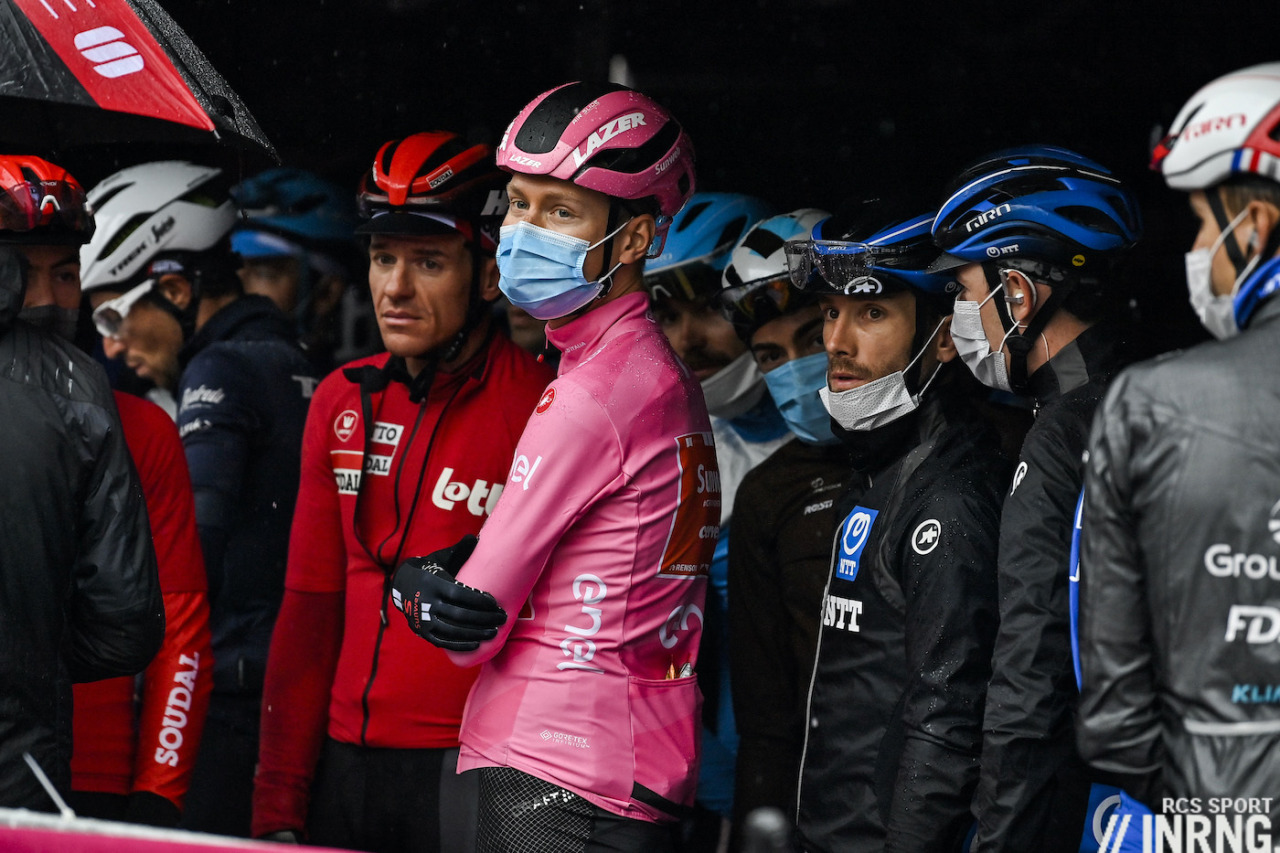
I’d never heard of this points and relegation system, why is this a big deal now?
Human nature? The three year system has been a fact for several years but it’s only with the two seasons done that it made sense to monitor the contest. It wasn’t a priority before, one team manager even thought it was settled last year, only his team’s now fighting to avoid relegation.
Will teams be relegated in 2023?
Normally not as next year is the first year of the 2023-2025 three year cycle. All teams want to win and place all the time of course but a wise team will think about ways to score next year so they’re not panicking come 2025.
So who’s going to get relegated?
It’s too soon to know. Lotto-Soudal and Israel-PremierTech are 19th and 20th on the rankings now but there are many races to come over the next two months, up to and including the Tour of Langkawi in October. Time is running out for Israel though but sport can always supply surprises.
You haven’t answered the thing I need to know
If you have more questions, ask in the comments and the best ones can get incorporated into the post above for future reference.



I am not sure that TdF stages are necessarily harder won than one day races. By the second half of the TdF stages are often fought out between a buch of riders an hour or more off the pace.
See this year’s Tour, the fight to get in the stage each day and the quality of the winners. It’s surely usually much tougher to win a Tour stage than a 1.1 race.
The quality of the winners was high (poor tactics by Pogacar perhaps) but there were also a lot of short stages.
The best way to compare is probably prestige. As a rider (or a sponsor!), would you rather win a Tour stage, or a 1.1 Local French race? Unless you’re a rider from that area and have already won a few Tour stages in your career, my guess is that you’d handily pick the Tour stage.
If so, the rankings should probably represent this preference.
(The counter argument is that the UCI can use points to support smaller races – teams that need points will seek out the smaller races that they wouldn’t otherwise wish to do, thereby offering some prestige to the local race, and keeping the base of the pyramid strong)
How can it be that only the top 5 score points in the TdF or other GT’s, but Ride London scores down to 60th place? It’s interesting that in all the articles discussing relegation they all mention automatic bids for the TdF, but the rewards are extremely top heavy for the biggest races of the year. Can’t believe 6th on a mountaintop finish scores no points on the biggest showcase for the sport. Promotion and relegation work for football, but the more I learn about it, it seems out of step with cycling.
That’s stages vs one day racing. As explained above you could up the points for the stages of the Tour but then you’d probably have to up the points for the overall as well in proportion. Also 60th in any race won’t help, yes points go to 60th but if it’s one point it’s unlikely promotion/relegation is this close.
As our host explains.
The schedules for ranking points are available at the UCI homepage: https://www.uci.org/regulations/3MyLDDrwJCJJ0BGGOFzOat#part-ii-road-races
Part II – Road Races, page 77 ff
May I ask where you get the information from for how many points each team has scored each week? Does the UCI actually publish this each week or is the only way to note down every team’s points total each week & work it out each week by subtracting the new totals from the previous week’s totals?
Yes, it’s by taking the current team rankings and subtracting last week’s numbers. I’ve got a spreadsheet where you drop the numbers in and get all the standings, charts, weekly change etc.
Thanks for your reply. I suppose it was too much to hope for that the UCI would publish the weekly information in a way that was easy for the more casual viewer to read!
The UCI don’t just fail to publish the rankings. Under their Regulations, the qualifying rankings are “for internal use only [and] may not be published”
I’ve only been following cycling for a few years so I may be missing something here but I would have thought the UCI would want to be publicising a big relegation battle to whip up the fans’ interest, not trying to hide it.
@Dawnstar – think about it from the team’s perspective: if they’re known to be in a relegation battle, it will make it harder to attract sponsors, which will make it harder to get/retain top riders, which will make it harder to score UCI points . . . The threat of relegation can lead to a negative feedback loop.
As Larry would say, the idea of World Tour was ill conceived. In a way the UCI had to introduce ever more complex fixes (which are often buggy themselves) to patch the initial bugs. In a way, the over complicated relegation system was one of these patches. I don’t guess UCI wasn’t kin about letting the whole world know how silly their system is.
It’s not actually that complex, is it? Each result in a race has a value, and the top 18 total scores after 3 years qualify for the next cycle.
There are lots of details, because there are lots of different teams and lots of different types of races, but ultimately it’s just addition.
Hi pro teams! Good luck!
I just wanted to say hi to you all. I know your coming here to INRNG to figure out all the details on relegation. I wish you all the best in your sporting efforts. It’s fun to watch.
What’s the latest on Astana? Are thee riders getting paid? Are high oil prices saving the team? In a sporting sense they’re having a terrible year, but maybe it doesn’t matter. Obviously if they disband so much of this relegation hand wringing becomes moot.
Since the UCI seems unwilling to step in and enforce their own regulations, I’m not sure it matters. In fact, if the UCI had enforced their own regulations back in the day, Astana would not even exist now, but that’s an entirely different conversation.
I had an awareness of the 3-year system from your previous posts and associated comments but your explanation above has set out very well the justification of its various aspects. Overall it seems it should achieve what it sets out to do; reward consistent good effort across the racing calendar and allow improving teams to leapfrog those that are not performing so well, gauged over a decent period of opportunity?
Can a team still buy a WorldTeam license from another? Let’s say a billionaire doesn’t make the cut by sporting means this cycle so he goes to a smaller budget team that did and offers them X million for their license. The smaller budget team may have the points to get automatic invites next season and the money could be used to bulk up their roster.
In theory, yes. But hard to see the team that would sell up.
Worth noting a practical example: the Intermarché team’s points from 2020 are not the Circus-Wanty team’s points from that year, but those of the CCC team as Wanty bought the CCC licence that year. It helped their points haul but not massively, the CCC team didn’t have an illustrious final season and the difference was about 800 points.
Like when Circus-Wanty Gobert bought its WorldTour licence from Team CCC in 2020?
I suppose so – but the smaller budget team would then have to be founded anew, as a completely new team entity, wouldn’t it?
I have no idea whether it would be possible to start as a ProTeam, that is to say whether UCI would award such a team a ProTeam licence.
(It could of course in its turn take over a financially struggling ProTeam…)
PS Idle speculation, but should Astana fold at the end of the season, there would surely be an interested buyer or maybe even two-
The offer could be something like “I’ll trade you our ProTeam license and X million for your WorldTeam license.” Instead of folding, a team with shaky finances (like Astana) could continue hoping for a brighter financial future.
Have to say I enjoy the contest. Makes me pay attention to small races.
I wonder if it’s also making some teams race harder too. Feels like the teams that need points are on the front more.
These smaller than worldtour races have never had so much motivated attention.
Even any remaining world tour races on the calendar are probably going to be more motivated. This includes the vuelta which is often at least partly populated by riders who would rather be on a beach and are just going through the motions.
For the relegation teams no longer sending a team of disinterested riders. Now every rider in those teams will be under strict orders to help the team score points.
Yes, indeed, I completely agree with both the above comments. Imagine how boring the season would be right now if there were only 18 teams interested in a WT license, and there was no relegation issue? We’d all continue to follow our favorite riders, and watch our favorite teams, and likely pay attention to the Vuelta, WCs, and a couple of other remaining races, but it would be easy to lose interest in these dog days of summer. But I’m checking away every day and watching quite a few races (at least the last 10-20 km) that I’d ordinarily skip. It’s frankly pretty damned exciting once you understand the system.
That’s why the football etc. league system works so well – the relegation battle is often the most dramatic and tends to duly attract attention while it lasts long – week in, week out, you pay attention to the drama that builds over time; because it generates probably a better story for us to identify with than the title / Europe race etc. – a tragic, fatal story of a underdog trying to get every point they can. And at least half a league tends to have something to play for late into the season. The famous “Agueroooooo” (and Dzeko) match deciding the EPL title struggle between frankly mediocre United and City teams in 2012 surely wouldn’t be so close had QPR have “nothing” to play for. (They fought relegation – indeed were relegated the next season I believe.)
Frankly, that’s exactly what makes me excited to open this blog every tuesday – the story, that builds up over time, with it’s fatal, tragic (well… relatively) consequences. I really wonder whether L-S can turn the tide (seems almost impossible now, but surely they will try until it’s mathematically impossible). Making some meaningful story of the whole season is something road cycling rather lacks, doesn’t it?
How is Total Energies the second placed ProTeam? Are ProTeams ranked on a different system? By glancing at the points tallies I would assume that Lotto Soudal and Israel would be in the safe automatic invite placings, rather than just Lotto Soudal with Total Energies in second.
They’ve scored more points *this season* than Israel, just. Things are quite close with both teams on 13 wins, 4 each in the World Tour but Total are on more points so far.
The key is the WT license is on a 3-year cycle, the top two ProTeams on an annual (one year) cycle.
There have been a few references over the past couple months to a team manager who “…even thought it was settled last year.” Was this Vaughters?
RV – There is nothing to suggest your claim has any validity. One could argue the chance is 1/15.
(some of Belgium and French teams were on top of this early on, thus no 1/18 – likewise some of the largest budget teams were likely much less focused on this process.)
I see the next UCI Congress is at Wollongong on 22 Sept so I assume any changes to the current World Team system will be decided there?
So on the one-year contest for pro team invites, is that also based on the top ten riders for the season? If so, I can see absolutely no incentive in Teuns’s mid-seaon transfer.
Yeah it seems pretty desperate. How many points does Israel’s 10th best rider this season have?
About 130. Teuns is at about 1000…
He is actually on zero, because the points he scored for Bahrain stay with Bahrain.
There is still time for a successful rider to get into the top ten. It has happened in the recent past for a mid season. Girmay last year scored 600 points. ISP 10th rider only has 123 points so if Teuns is in good form and at the correct races can go past that.
Plus he could also just be used as a super domestique to help others score.
Dylan Teuns is not going to be used as a super-domestique for Itamar Einhorn.
Maybe not, but that leaves nine riders among the ISP Top Ten for whom Teuns could conceivably help score UCI points.
But as long as it is a realistic possibility that he will pass Einhorn in points, it is probably the wisest thing to let him do what he does best and race with the goal of finishing as the best ISP rider od the day.
PS Even if didn’t earn a single point this year, Teuns will of course be worth every euro, dollar or shekel he gets paid in 2023 if and when his contribution to the team’s points tally is sufficient to earn ISP a GT invite as one of the two best ProTeams.
A question about the World Tour: What determines the allocation of events into World Tour, ProSeries, etc.?
Recently the Tour de Pologne (UWT) and the Vuelta a Burgos (Pro) were running concurrently. Watching the highlights, in my opinion, Burgos was a better race, but has a lesser status in the UCI’s allocation.
Is the answer simple: “Money”.
There are good and bad races, and good and bad editions of them as well, this year’s vintage in Poland won’t pass the DVD test: you wouldn’t buy the highlights DVD, you wouldn’t buy a DVD player so you could watch it either.
The idea with the World Tour is to have a broad calendar of races around the world, although obviously there are few races outside of Europe, so having one big pro race in Poland makes sense, while Spain can have the Vuelta, San Sebastian, Catalunya, Basque Tour etc, and still have many more Tour of [region] races. There’s money in this to the extent that the sport wants to serve sponsors, reach TV markets etc.
A World Tour race sounds great but you have to host the 18 World Tour teams and then don’t have room to invite many more. Whereas the lower the category, the more local teams you can invite which suits many a smaller race.
Thanks for the response and for the consistently excellent coverage.
To a newbie, it seem strange that there are no World Tour races in the USA. Especially considering the increasing number of American pro riders. Is there any reason for this?
There was the Tour of California but this stopped as the costs of organising it were too much and the TV rights/host town income/sponsorship weren’t very big in return.
(officially it’s on pause, more on the race’s demise at http://inrng.com/2019/10/tour-of-california-hiatus/)
Pretty expensive in a place like the US or australia to conduct.
Australia has 2 races i guess but the only reason why is because the state governments supply probably millions to subsidise the tdf and if not millions at least 100’s of thousands the the cadel race. I doubt the australian races have a long future but would love to be wrong. They are one skeptical politician away from being cancelled.
Its super hard and expensive in these places and the sponsors $ are just not there for the low viewership on tv especially compared to other sports. Note greenedge still does not have a proper title sponsor.
Does it work for promoting cycle racing in this country. Maybe but not in the region i live. In the last 10 years we have gone from 5 separate small country clubs doing racing to not enough riders from all clubs combined being able to muster a decent race. And 20 people across all grades is all we would consider good.
I suspect the US is pretty similiar with unacceptable costs.
I honestly think the biggest drawback for both the US and Australia is not the cost, but the logistics. If you wanted to start a new one day race in, say, Romania, it’s might not be immediately attractive to WT teams, but attending the race would not be a logistical nightmare. If you try to do the same thing in West Virginia or Perth, the challenges are pretty obvious. The two Canadian races only really work because of where they are in the calendar and because there are two in close succession. If there were one, would as many teams show up? Probably not. The best chance for a successful new race in the US would probably be to place it the same week as the Canadian races and in upstate New York. The teams are already racing and it’s pretty trivial to go from Montreal to upstate New York. Likewise, any new Australian race would probably have to happen immediately before or after the other two. If not, how many non-Australian (or Kiwi) teams would show up?
The SA state government contribution to the TDU is only AU$4 million, which covers the men’s Wt race, women’s WT race and all the other associated events including UCI classified Track and BMX meets. It is the second highest earning tourism investment for SA behind only Formula One (without which there would be no TDU, it was one of the GP replacement events) and outranks F1 in terms of the benefit:cost ratio.
Both major political parties are in full support of the event and it isn’t going anywhere any time soon … unless the UCI cancels it for a third time around.
IR suggests “Likewise while there are no historical rankings to compare Eddy Merckx with Bernard Hinault…”
But the PCS site has an all time ranking with the obvious Eddy leading though it surprises this reader to see Jalabert at 9th and ahead of Coppi, Bartali and Maertens while Zabel at 17th is ahead of Indurain, Binda and Poulidor. Races gain and lose in importance which makes the game so hard. When I started to follow the sport Bordeaux-Paris was still a classic while Strade didn’t even exist. Maybe a subject for winter days.
To be fair to PCS, their all-time rating is based on the results they have in their database. And the further back in time they go, the less complete their database is. So they have probably captured more of Jalabert and Zabel’s performances than the older riders’. (And Indurain didn’t actually win that many races compared with Zabel.)
Thanks for the write up on this. It’s definitely adding interest for me: every race I scan down the results for ‘Relegation Battle’ teams.
Doping could have a bad impact on this. If a doped rider’s results saved a team from relegation but the investigation only commenced after a clean relegated team had folded it would be very unfair.
Possibly an incentive for a desperate team facing relegation and sponsor withdrawal to at least turn a blind eye to doping in the last few weeks?
It’s one of the reasons they use the top-10 riders for points as well. To cut a long story short the UCI commissioned a study to look into practices in teams and one thing from the riders was that the pressure to win points was seen as an incentive for doping, they needed points to justify a contract at times. Now the pressure to win, to get a bigger contract is an ever present incentive of course, but when every rider was measured by their points tally a decade ago it was an additional pressure so they started ranking teams by their best 15 instead, went to 12 and now it’s 10 riders.
There’s always a pressure for survival but it’s hard to see a team manager sitting down with riders saying “we’ve been clean until now, but facing relegation we’re starting a doping program”. Riders could say no because it would all be to save the management, while their health and career would be on the line.
Some other reasons the idea that a team might suddenly tacitly endorse doping late in the season is that it would be extremely high risk (you’re doping at a time when riders are being tested frequently, unlike the off season, and the riders that finish high are tested even more aggressively. And to what end? I think what many people misunderstand about the benefits of doping is that for many doping products the key efficacy is that they allow one to train much harder, so that later when they’re in races they’re at a higher level than they would have been. To suddenly start doping late in the season would likely give modest performance benefits, and certainly not in proportion to the risk.
And of course management would be endorsing the most sure-fire way to drive away sponsors (get caught doping) to avoid losing sponsors because of possible relegation.
So let’s say there’s a new organiser with media partners and a slew of big money sponsors lined up to back a new three day race.
How is that pitched to the UCI so it jumps into the calendar with a really big points tariff?
Isn’t this aspect fundamental to the points system but isn’t it all a bit cryptic..?
It goes through a lot of committees and admin, first nationally and then to the UCI and also the PCC committee that is staffed jointly by the UCI, pro teams and race organisers. Having a lot of money means a new race could meet a lot of the admin, logistics etc from the start but it’s not a given. If you were trying to launch a new race in the US you’d probably find a tailwind that you might not get if it was yet another World Tour race in Belgium.
But for the points it’s not so mysterious, all 18 teams have to take part so there’s no disparity. It’s more when you look at the calendar and the plethora of points in the .Pro and .1 races.
Thanks for this and your weekly updates on the subject,
how does the 10 ten riders for each team thing work? is it pre determined at the start or adjusted as the season progresses, i.e 20th ranked rider has a great day and some luck and wins a one day, would that not count?
It’s the best scorers, so if a rider has no points today but suddenly wins the Vuelta they’ll bring lots of points to the team when it counts at the end of the season.
Remember too that non-scoring riders can go for placings to take away points that other teams might win.
And Thank You for the answer on new races. It’s a costly business. Seems anything new either relies on a large sportive entry or just big money.
As is clear by now, Quintana, was DQ’d from the Tour de France.
This set’s up an interesting situation. There were two positives (with one rider), does this set up the situation for the UCI to be challenged by other teams on all of Nairo’s points? Does this cause a challenge with the sporting criteria?
At the minimum, it seems that Arkea is now back in the points competition about equal with Cofidis and Bike Exchange – and a bit ahead of EF and Movistar. Do they push other riders now?
I see you were working on an article on this matter when this was posted… well written update in that new post.